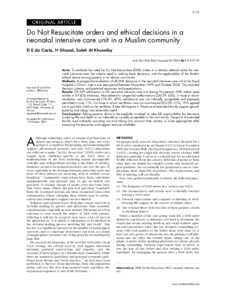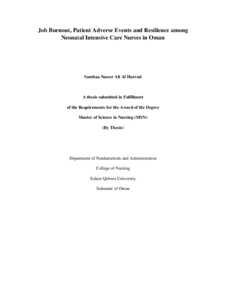Document
Do not resuscitate orders and ethical decisions in a neonatal intensive care unit in a muslim community.
Identifier
DOI: 10.1136/fn.86.2.f115
Source
Archives of Disease in Childhood: Fetal and Neonatal Edition. v. 86, 2, p. F115-F118
Contributors
Ghazal, H., Author
Al-Khusaiby, Saleh., Author
Country
United Kingdom.
City
London.
Publisher
BMJ Publishing Group.
Gregorian
2002-03-01
Language
English
Subject
English abstract
Aims: To evaluate the need for Do Not Resuscitate (DNR) orders in a tertiary referral centre for neonatal intensive care, the criteria used in making these decisions, and the applicability of the Muslim ethical stance among parents in an Islamic community. Methods: A prospective evaluation of all DNR decisions in the neonatal intensive care unit at the Royal Hospital in Oman, over a one year period between November 1999 and October 2000. This included decision criteria, and parental responses and expectations. Results: Of 659 admissions to the neonatal intensive care unit during this period, DNR orders were written in 39 (6%) instances. Most related to congenital malformations (24/39, 62%). In those in whom ventilation was commenced (19/39, 49%) withdrawal was not culturally acceptable and expressly permitted in only 11%. For those in whom ventilation was not commenced (20/39, 51%), 70% agreed not to put their child on the ventilator if they did require it. Presence of extended family support (grandparents) and clergy was extremely useful. Conclusions: Asking parents alone to be explicitly involved or take full responsibility for decisions involving life and death is not culturally or socially acceptable in this community. Presence of extended family, and indirectly sounding out and taking into account their wishes, is more appropriate after assessing the resources and support services available.
ISSN
1359-2998
Resource URL
Category
Journal articles


